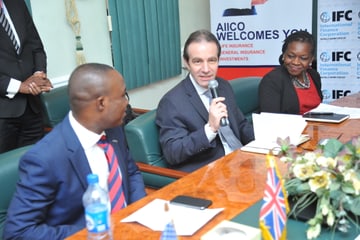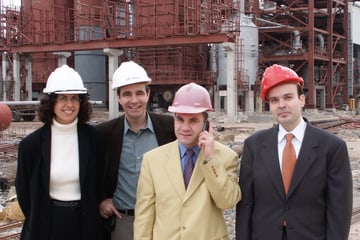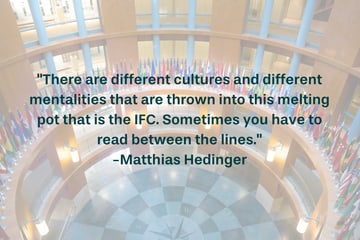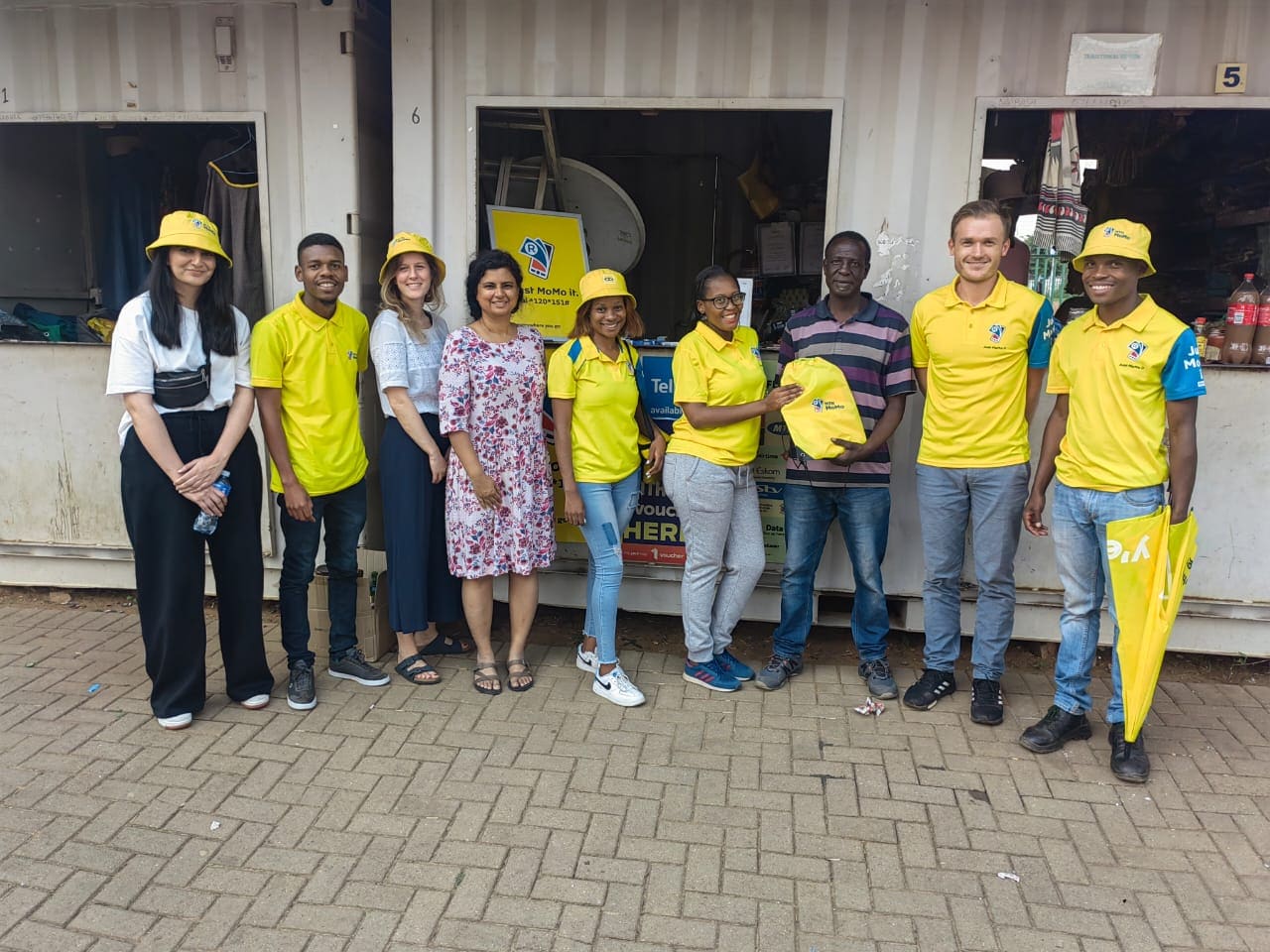The difference between private banking and multilateral finance: insights from Matthias Hedinger
Matthias Hedinger, a Principal Investment Officer at the International Finance Corporation (IFC), tells us about his role, the difference between working at IFC and a private bank, the reasons behind his career choice, and the current topics concerning IFC.

Blog series about careers in finance with multilateral organisations
Working in the financial sector of multilateral organisations – it sounds a bit dry at first, but it's not at all. In this blog series, we take a closer look at the subject, hear from individuals about how they came to work for the International Finance Corporation (IFC) and what they expected to find, and define which candidates are in demand at IFC today.
About Matthias Hedinger
- Born 1964
- Education: Master of Business Administration
- Current position: Principal Investment Officer, Sector Lead Insurance and Pension Investments, Latin America, Africa, EMENA
- Most significant jobs to date: Associate Director, SBC Warburg; Sector Lead Insurance, Financial Institutions Group, IFC
You are currently working as a Principal Investment Officer at IFC. What is your role, and what are the responsibilities in this position?
My role has to be seen within the context of IFC as an institution. IFC is the private sector arm of the World Bank Group, so we interact with private sector clients. Within this branch, we have four verticals, the first being the Financial Institutions Group (FIG). We do business with banks, insurance companies, leasing companies, microfinance companies, FinTechs, structured transactions with special purpose vehicles and other financial institutions. The second vertical is manufacturing, agriculture and services. The third is infrastructure, where we have toll roads, power plants, etc., frequently funded on a project finance basis with limited recourse to the sponsors of these projects. And finally, the fourth vertical – a very innovative sector; venture capital financing and private equity funds.
My position is within the FIG vertical. As a Principal Investment Officer who exclusively covers Latin America, I acquire new clients and develop new deals. I find clients in which IFC can invest, assess these clients and explore whether they are a good investment opportunity. After finding potential investment opportunities, I do the due diligence, propose the deals to the management, and get them approved, negotiated, and structured. Working in such a close fashion with my clients, I would call myself a relationship manager.
How would you say this role differs in a multilateral finance institution from a private bank?
In private banks, responsibilities are more compartmentalised. You work in your area of expertise: one person would only deal with new client acquisitions, another would deal with due diligence, and another would deal with deal structuring and legal negotiations. It's a clearly defined and relatively narrow area.
I have much bigger wings at IFC. You have a broader remit, which is the attraction of working here. That means I have to understand the regulatory framework in the financial sectors of the countries I cover, as well as the specific industry dynamics (e.g. banking vs. insurance sector). I also need to understand aspects of anti-money laundering, integrity due diligence and sustainability aspects. I need to understand aspects of corporate governance, financial covenants, IFRS and different accounting standards in other countries. I also require a legal understanding of international trade and corporate laws (most of our contracts are according to New York law).
Furthermore, you get to work with many different teams. Every time we have a new transaction, we create a new team with, for example, a lawyer, an environmental specialist, or an insurance specialist. These team members have a profound understanding of their respective subject matter. As a team leader, I need to understand all these subjects, not to the same depth, but at least a general understanding.
What was the reason behind your decision to leave Switzerland for a career in a multilateral financial institution?
I have always had curiosity and interest in life abroad and had the idea to leave Switzerland to see what it was like to work in a foreign country. Initially, I wanted to work abroad for 3-5 years before returning. But then I got the chance to do a long-term secondment with IFC. What I found most interesting was that I could work in all the emerging markets worldwide. The international dimension was what attracted me to this job. If you're curious, here at IFC, you have a platform which allows you to go around the world and interact with all kinds of people. I have negotiated with the biggest Russian oil company and dealt with the largest family business in Yemen. I have dealt with the largest bank in Papua New Guinea, the biggest petrochemical company in Brazil, the largest life insurance company in East Africa, and established a new type of microfinance institution in China across the border from Hong Kong. You end up dealing with all sorts of people globally, which is incredibly fascinating. This requires a certain cultural adaptability and sensitivity.

If you're curious, here at IFC, you have a platform which allows you to go around the world and interact with all kinds of people.
How has your work changed over the past decade? What are the topics that concern IFC right now?
I have seen different themes coming and going throughout my time at IFC. One of the most burning topics now is climate finance and how we, as a developmental institution, can contribute to fighting global warming. Our investments need to align with the Paris Agreement.
When I started with IFC, there was a considerable drive towards microfinance. Today, microfinance has been moving into the background because we have FinTech. In 2008/2009, during the financial crisis, it was all about crisis response. We, as IFC, had to think about how best to support economic systems impacted by the global financial crisis. Similarly, with COVID-19, we did a response initiative where we tried to keep financial institutions afloat to help them get through this time and make sure they keep lending to their small and medium enterprise (SME) clients.
That's another thing that makes it very interesting to work here, because I often say that IFC is at the intersection of business and politics. On one hand, our private sector-oriented, business-focused model is vital to promote economic activities in a country. On the other, political and development aspects trickle into our investment considerations as well. It's different from UBS, Credit Suisse or other commercial banks. I have to make profitable deals for my shareholders (which are most governments in the world, including the Swiss government) which also create high value for the population in a given country, i.e. my deals have to create positive development impacts. In IFC, we have this double bottom line where we say, “Okay, the deal is good for IFC, but what does it do for this country’s development? What does it do for strengthening this sector?” And again, that's an exciting dimension.
This sound like a very interesting and challenging environment to work in. What competencies and skills should interested candidates bring if they want to work in an organisation such as IFC?
In terms of educational background, an academic course in finance, MBA and CFA training is an excellent background for a job like this. However, I also believe that interdisciplinary thinking is quite important. It is crucial that you have the flexibility to deal with many different issues and questions that come your way. Furthermore, candidates need to demonstrate analytical and interconnected thinking. Not only should you be able to handle numbers, but you also have to understand how different issues and topics are linked.
When it comes to interpersonal skills, it is important to have the ability to work with multicultural teams. There are different cultures and different mentalities that are thrown into this melting pot that is the IFC. Sometimes you have to read between the lines. There are cultural challenges that you have to get used to. Being aware that people react differently and that you may have to tailor your communication to the person you are dealing with is essential in this kind of environment. But it’s really learning by doing and observing.

What else do people need to be aware of when wanting to pursue a career in a multilateral financial institution?
Fixed-term contracts are a big difference from working for a private-sector organisation or company. You get an approximate three-year contract, which, can be renewed. But it requires a lot of flexibility and having to deal with the sense of uncertainty at the end of the three-year term.
IFC is also a big institution that tends to be somewhat bureaucratic, making internal processes not always easy to manoeuvre. It's not for everyone. It takes a lot of patience and perseverance to deal with that. And yes, it can be frustrating at times.
Moreover, if you have worked in a multilateral financial organisation for a long time, it can be challenging to come back to work in the Swiss market. Sometimes an employer cannot connect your experience and work with what they seek in the Swiss labour market. And that is indeed a significant disadvantage. But there are increasingly more companies who understand what IFC does. But even now, IFC is like a black box for many Swiss companies. I highly recommend staying in touch with your network and Swiss companies while abroad. That way, you can always return and still access good career opportunities in the home market.
If you had the chance to go back in time, would you do it all over again and take that risk?
Absolutely, yes! It has been a great experience so far, and I can only recommend it. To sum it up, my biggest gains are the exposure to different countries and cultures, taking on a lot of responsibility and making a difference in the world with the work I do daily.



